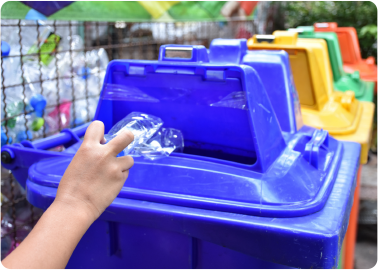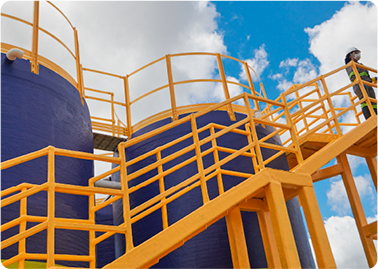
To guarantee the quality and efficiency of the water and sewage treatment processes, the protection of the environment and the protection of people, BRK has ManagementSystems that guarantee the definition and implementation of processes in a standardized way at the operating units.
ISO standards establish requirements for the implementation and operation of management systems, in addition to guiding external companies (certifiers) to assess whether the management systems implemented by organizations adhere to the best practices and established procedures. Among the advantages of adhering to these international standards is the guarantee of good corporate governance practices, such as ISO 9001, which guarantees the effectiveness of the quality management system, ISO 14001, which establishes the environmental management system, ISO 17025, which brings requirements for the competence of water and sewage quality control laboratories, and ISO 45001, which attests to the maintenance of workers’ physical integrity and health.
BRK has ISO certifications in seven business units. Six of them comply with ISO 9001, four are ISO 14001 certified, three are ISO 45001 certified, and four are ISO 17025 accredited. This total means that 72% of the most relevant units for the generation of the company’s net revenue comply with the highest international standards, with competence recognized by an external certifying body.
| UNIT | ISO 9001 | ISO 14001 | ISO 17025 | ISO 45001 |
|---|---|---|---|---|
| Cachoeiro do Itapemirim (ES) | ||||
| Jaguaribe (BA) | ||||
| Limeira (SP) | ||||
| Mauá (SP) | ||||
| RMR (PE) | ||||
| Saneatins (TO) | ||||
| Rio das Ostras (RJ) | ||||
| BRK certifications (in relation to the total of existing Units) |
25% | 17% | 17% | 13% |
| Representativeness by ISO in BRK’s NOR | 48% | 40% | 30% | 24% |
For the evolution of management systems, there is a full involvement of BRK’s senior management, since these systems consistently ensure that the organization improves the flow of internal activities based on Quality, Environment, Health and Safety policies. The company’s senior management analyzes the management systems at a minimum annual frequency, in order to ensure the tool’s adherence to the corporate strategy. The coordination and/or direction assessments are conducted by the leaders and recorded in minutes and action plans, documents that are later disseminated among the leaders of each process.
The certified operating units undergo annual audits which, in addition to other practices, ensure the maintenance of certifications. To ensure the continuous improvement and effectiveness of management systems, the quality, environment, health and work safety policy, audit results, critical analysis by management, as well as data and corrective actions are used as an assessment parameter.
Documents, records and information related to the units are controlled in order to ensure that the current and in-use version of the tool is available whenever necessary. For this, all the documentation is structured in four levels:
| LEVEL | HIERARCHY | TYPICAL DOCUMENTS |
|---|---|---|
| Level I | Strategic documents | Management Manual |
| Level II | Tactical documents | Procedures and process maps |
| Level III | Operational documents | Work instructions |
| Level IV | Forms, documented information and records, external documents | Normative instrument with additional information and/or proof of the process results. Standards, manuals, guides, ordinances, laws and others of external origin |
The records, presented in physical or electronic form, are kept to guarantee and evidence compliance with the specified requirements, in addition to ensuring the effective operation of the management systems. The quality of records is frequently checked to ensure continuous improvement.
BRK adopts procedures to periodically assess compliance with legal requirements and quality, environmental and employee health and physical integrity protection procedures.
Management System Certifications: quality, environment, safety and health Preservation of biodiversity on the strategic agenda BRK knows the importance of waste management and the impacts it can cause BRK works to guarantee the availability of water for the population, with quality and safety Reducing GHG emissions is a BRK commitment Investments in digital platforms to monitor water and effluent quality Management of internal consumption of water and reuse waterSee too






